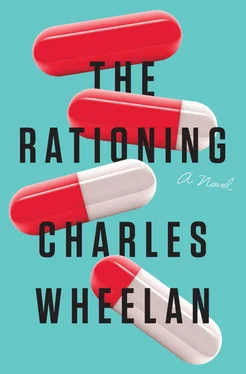“Do you have a sense of when he’ll be back?” I asked, trying to steer a path between urgency and rudeness.
“He was going to Home Depot, but usually that means he’s going to stop at the driving range,” she said. I remembered the driving range, a decrepit little place with mats and nets at the end of a huge strip mall (near the Home Depot). There was a soft-serve ice-cream cart in the parking lot that was popular with Dartmouth students.
“Does he carry a cell phone?” I asked.
“May I ask who’s calling?” she replied, more curious than suspicious. I apologized and explained as briefly as I could why I needed to reach her husband. “Oh, yes, you visited us,” she said. “Richard really enjoyed speaking with you. He does have a mobile phone, but I can see it right here on the dining room table. I keep telling him there’s no point in having a mobile phone if all he’s going to do is leave it at home.”
Huke called back about a half hour later. “I went to the driving range. The course opens this weekend,” he said, as if he needed to explain his whereabouts. “So how bad is this Capellaviridae ?”
“Not terrible in the grand scheme of things,” I said truthfully. “It acts like a virulent strain of influenza.”
“That can be pretty bad,” he said.
“True, but the Dormigen gap is not that big. We’re only looking at about a week without it.”
“Yes, I’ve read about how they are trying to stretch out what they’ve got.”
“I’m calling because I want to bounce a hypothesis off of you,” I said. “A theory of how lurking viruses might work.”
“Very exciting! Okay, I’m listening,” he said. I explained the thoughts that had been percolating through my brain that morning, including the example of the venomous snake and the baby lizards. I also explained some of the patterns that Tie Guy had observed, such as the fact that Capellaviridae was most likely to turn virulent in areas where there had been the most aggressive efforts to eradicate the North American dust mite.
“That’s certainly enough to get you a plump research grant,” he answered, “but there are still a lot of things to be worked out, even if you’re right.” And then, after a moment: “How long do you have?”
“Days,” I said. “Not even a week.” Huke did not answer right away. His silence signaled the obvious: we needed years, or at least months, to turn this thought into anything practical—and even that assumed I was racing along the right track. “Here’s what I’m thinking,” I continued. “When people become sick with the virulent form of Capellaviridae, we need to reintroduce them to the North American dust mite.”
“Hmm.” Huke was silent as he tried to follow my line of thinking. Eventually he said, “You are thinking that this dust mite fights back somehow, using Capellaviridae ?”
“Yes.”
“But you don’t know how. Just that Capellaviridae turns virulent when the dust mite disappears,” he said.
“Yes. Either because the dust mite gets exterminated, or because people move from an area where the dust mite is endemic to a place where it’s not. In both cases, when there are no North American dust mites, the virus can turn virulent.”
“There’s no harm in testing it, is there?” Huke asked.
“Well, it might be hard to persuade people who are sick with Capellaviridae that the cure involves letting them get bit by the same dust mite that gave them the virus in the first place.”
Huke laughed. “Do you think it was easy persuading people that injecting them with a weakened polio virus would protect them from polio?”
THE PRESIDENT WAS OPENLY AND SHOCKINGLY DISMISSIVE OF many members of Congress. Part of that stemmed from his animus toward the Speaker, which had only deepened since the beginning of the Outbreak. “You don’t have to be a genius to win an election,” the President told me once after I had expressed amazement when a congresswoman from Arizona declared that it was still an “open question” as to whether germs cause disease. “That’s not the craziest thing I’ve heard,” he said, turning to the Chief of Staff. “What’s the name of that guy from Tennessee who kept introducing bills to ban witchcraft in schools?”
“I don’t remember his name, but he served eight or ten terms,” the Chief of Staff said.
“Then he got arrested for sexual assault.”
“No,” the Chief of Staff corrected him. “That was the guy from Kentucky.”
“With the wooden leg.”
“I don’t think it was wooden, but yes, he had a prosthetic leg.”
The President turned to me and explained, “He ran a campaign saying he’d lost his leg to an IED in Afghanistan. Turns out he was never in the Army. He lost his leg in a drunk-driving accident on a motorcycle.”
“He still got elected,” the Chief of Staff added.
“He served a bunch of terms. Didn’t he get reelected after he was arrested?”
“I think so,” the Chief of Staff said. “He had to give up the seat when he was sentenced. There was a special election.”
“That’s right,” the President said.
“How does someone get elected with a fake war record and then reelected after being arrested for sexual assault?” I asked.
The President waved his hand dismissively, suggesting my question was as naïve as I felt it to be. “He blamed the press. Said it was fake news. All the usual crap.” Then he turned more serious. “People aren’t paying attention. That’s really it. Americans are busy driving their kids to soccer practice and designing iPhone apps and bashing government—until something like this happens, then everyone wants to know who’s going to fix the mess. Is there an iPhone app for this?” He picked the Chief of Staff’s phone up off the table in front of us. “Which button do I push to get more Dormigen? Is there an app to fix the Middle East? How about getting Newark schoolkids to read at grade level? Has Silicon Valley figured that one out yet?” An uncomfortable silence settled over the room. Then the President said, “They elected him again, didn’t they?”
“Who?” the Chief of Staff asked.
“The guy with the prosthetic leg who got arrested for sexual assault.”
“Yes, I think so. He ran when he got out of prison.”
The President threw up his arms, as if to say, “See!” And then after a moment, more seriously: “You can’t systematically ignore governance and then expect it to work well.”
I remember passing the Chief of Staff in the corridor hours later. She pulled me aside and said, “He’s tired.” I knew immediately what she was referring to.
“That doesn’t make him wrong,” I replied.
“No.”
Congress had certainly not distinguished itself in the hours since the Outbreak had become public. There had been a flurry of legislation introduced to nail the barn door shut: a bill to ban the outsourcing of Dormigen production; a bill declaring access to Dormigen “a basic American right”; a bill formally censuring Centera; and many others that had no chance of passing and would not have helped the situation even if they had. Then there was the bill demanding an investigation into Israeli involvement in the Dormigen shortage (introduced by the avowedly anti-Semitic “white Christian caucus”). This was the “teakettle” activity that the Senate Majority Leader had predicted at the beginning of the crisis—legislators presenting the illusion of action for constituents who did not know, or did not care, that introducing a bill is different than passing a law.
The President was not, however, dismissive of Congress the institution. He had a group of legislators whom he and the Chief of Staff referred to as “the adults.” Every once in a while, he would turn to her and say, “Let’s run it by the adults.” As best as I could infer, this was a group of ten or twelve senators and thirty or forty House members whom the President respected a great deal. The group, which studiously avoided publicity, had coalesced near the end of the Trump presidency when a handful of serious legislators across parties began to believe that American governance had become dangerously unhinged. Some of the more impressive legislators in each chamber—former governors and Rhodes Scholars and CEOs and even a Ph.D.—began meeting informally after yet one more threatened government shutdown. There was no formal membership, just a series of relationships among serious people who sought to transcend the rancor and futility that had engulfed Washington. There was no ideological litmus test; the group included several committed progressives and one hard-core libertarian. What the participants had in common was a genuine commitment to civility and an aspiration to govern. In that spirit, they called themselves the “Conventioneers,” after the delegates to the Constitutional Convention, the group of Americans who came to Philadelphia in 1787 representing an array of regions, interests, and ideologies and, over the course of a long, hot, arduous summer, managed to compromise their way to one of the greatest political documents ever written. No one ever told me why the President called them the “adults” rather than the “Conventioneers.” I do know that the Congressman from Kentucky with the prosthetic leg was not one of them.
Читать дальше












